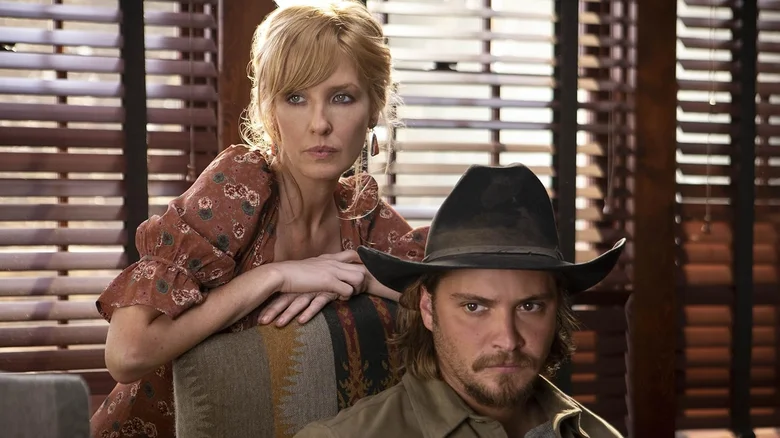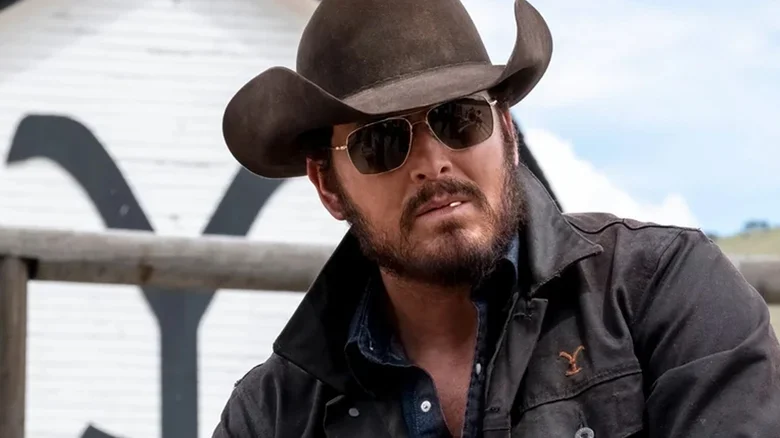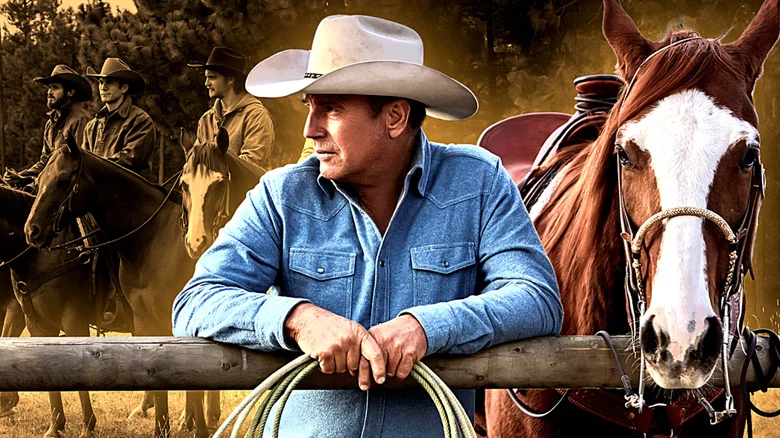When it comes to TV success stories, “Yellowstone” is a bit of a head-scratcher It’s not that the Western series about a powerful ranch-owning family backstabbing one another isn’t interesting, but rather, its target audience is surprisingly unclear. The Paramount Network show gets boatloads of viewers, but who exactly are they? /Film has frequently joked that every dad in America watches “Yellowstone,” and much has been made of its audience in Middle America, but it seems obvious that the show also has a considerable number of city slicker fans, too. It’s especially hard to pinpoint the “Yellowstone” demographic given its sometimes paradoxical politics; Andrea Long Chu once wrote a Vulture piece about how the show is known for its red-state popularity, yet it features vaguely left-leaning politics — all while remaining focused on the grievances of white American land owners.
“Sheridan is only part cowboy,” Chu wrote of the show’s creator Taylor Sheridan, noting that his dad was a cardiologist and he weekended at his mother’s ranch. “‘Yellowstone’ is full of horse-lipped attempts at cowboy lyricism,” she continued, “But one often feels Sheridan is trying, by poetical brute force, to reverse-engineer wisdom from prosody.” Whether it’s the show’s ethics, aesthetics, or execution, there’s definitely something about “Yellowstone” that rings false for some country folk, even as millions of people regularly tune in to watch the show. I’ve personally recommended the series to several close family members who were born and raised on Kansas farmland, or who constantly threaten to move to open-skied Montana, where the show is set. Their conclusion? It’s good, but it’s not remotely realistic, and it’s more soap opera than true Western.
Real-life ranchers weigh in on Yellowstone

So, is “Yellowstone” a show for cowboys or just Hollywood cowboy cosplay with enough backstabbing to keep its considerable audience hooked? Your mileage may vary, but when it comes to people who have actually lived the modern ranch life, it sounds like the show is a jumble of accurate and unrealistic elements combined. After the first part of season 5 wrapped up, Variety interviewed Idaho rancher Jesse Jarvis about the show to ask about what did and didn’t ring true to her. Jarvis said that many of the series’ themes are true to life, citing family drama, issues with a rural population boom, cowboys’ pride in their land, and ranchers’ close relationship with their state governments as elements that the show got right.
Jarvis also noted that the show gets some major details correct, like the rodeo sequences and the clothes ranchers wear. “You’ll see a lot of Kimes Ranch on the show — that’s a brand we wear,” she told Variety. “The hats they wear, they’re from brands like American Hat and Greeley Hat, which we also wear.” Jarvis said that she thinks Sheridan, who currently lives on a ranch in Texas, “wants to bring the truth and depict the correct image” of the rancher lifestyle since he’s “so invested” in it himself. Jarvis also noted that Rip Wheeler, the fan favorite character played by Cole Hauser, is the most accurately dressed character on the show. Her one gripe? The cowboy hat ranch hand Jimmy (Jefferson White) wore back in season 1. “That looks like it came from a country music festival. We don’t wear those,” Jarvis explained.
As for what’s not accurate about “Yellowstone,” Jarvis said the show’s swearing and violence is totally overblown: “Sometimes it seems like someone is getting shot every single episode!” Her other major qualm relates to the show’s depictions of the Dutton family’s wealth. The rancher notes that the inclusion of helicopters and top-of-the-line pickup trucks and trailers doesn’t really jive with the realities of the business. “There are some ranches that are investor-owned that have access to those types of things, but that is a very small percentage,” Jarvis concluded. “Their money isn’t necessarily a good depiction of what ranchers and farmers are working with financially.”
Yellowstone mixes authenticity with plenty of screen magic

Other ranchers and farmers have weighed in on “Yellowstone” as well, with several answering a question posted in the show’s Subreddit about how accurate its depiction of ranch culture is. “What I like about the show is how clean everyone is at the end of the day,” one user who introduced themselves as a farmer from North Carolina commented. “I’m never clean. If my hands aren’t coated in grease my clothes are so dirty my wife has to blow off the worst of it with the air hose.” Another noted that scenes related to the threat of wildlife against livestock are realistic, while adding that “the violence, fighting and killing isn’t realistic at all.”
Many commenters agreed that the general issues the Dutton family faces as ranchers are fairly realistic, while the dramatic, murderous way they cope with those problems is clearly imaginary. “Rich corporations wanting to develop land into mega cities and airports is realistic,” one user commented, before adding, “Killing everyone who crosses you and dumping them [on] the side of the road in an empty county so you can’t put a jury together is not real.” Another commonly cited inaccuracy in the show is its relatively mild weather. “People are rugged, weathered and exhausted from working 10-hour days, outside in temperatures ranging from 100 degrees to 40 below, often seven days a week,” one Montanan wrote on a blog post for the company Jelt Belt. Meanwhile, the show rarely ever seems to depict harsh winters.
The differences between the “Yellowstone” world and the real world are numerous, with Jelt Belt also noting the impossibly brief commutes characters have between towns that are actually hundreds of miles from one another. Still, the same post cites the show’s references to a meth crisis and the disappearance of Indigenous women as two serious topics that Montanans do truly grapple with, and gives the show kudos for addressing them. All in all, it sounds like the series takes plenty of liberties with its depiction of Montana ranch life, but it also gets more than a few things right. It’s certainly doing something right, as the “Yellowstone” season 5 premiere earned higher viewership numbers than anything else on TV in 2022.
The long-awaited and (supposedly) final batch of “Yellowstone” episodes will premiere on the Paramount Network on November 10, 2024.
